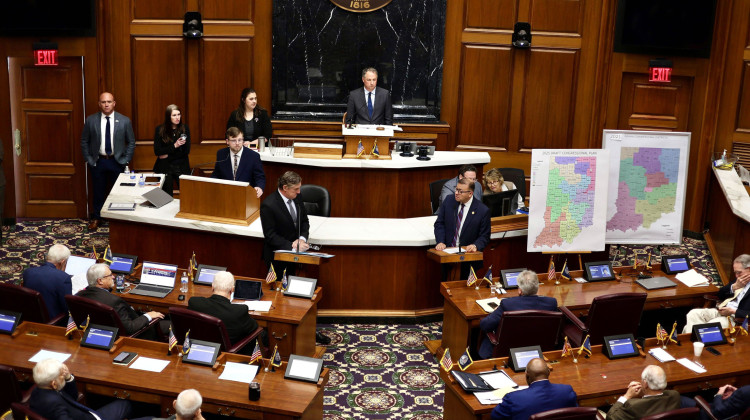Affordable housing is increasingly difficult to find in Indianapolis. House prices have risen since the pandemic, interest rates are up and rent is more expensive. This impacts low and moderate-income residents more acutely, and wages are not keeping up.
City governments can address this issue in a variety of ways – and Indianapolis mayoral candidates Republican Jefferson Shreve and incumbent Democratic Mayor Joe Hogsett have both acknowledged the problem is a priority during their 2023 campaigns.
In interviews with WFYI, Hogsett and Shreve talked about how to address the city’s housing issues.
Hogsett said he aims to make Indianapolis a place where everyone can find a home.
“And whether that's market rate, residential housing downtown, which is exploding, or whether that's workforce housing, or below market rate housing – however you want to define the term affordable, it needs to be affordable for everyone in the city of Indianapolis, and that’s what we are committed to providing,” Hogsett said.
Challenger Shreve said the market continues to be unaffordable for many. Both candidates agree on the need to create more supply.
“Supply and demand is market-based, it's market-driven, and what can a Shreve administration do about that – well, you influence some of those elements that control the speed with which inventory can be delivered to market,” Shreve said.
The city has created a number of affordable housing units in Indianapolis over the past few years. The market can use more housing of all types, including single-family homes, market rate apartments and safe, affordable subsidized housing.
The city said it invested about $20 million in American Rescue Plan Act money to add affordable housing units.
In 2022 the city was able to add 1,560 units, and an estimated 760 units this year.
But Indianapolis still needs more. The local research group SAVI has estimated a citywide shortage of over 30,000 affordable housing units for extremely low-income households.
Creating new stock can help improve supply and demand. During this year’s municipal election campaign, WFYI heard from numerous City-Council candidates about bureaucratic inefficiencies they said have stalled development progress. Shreve – like others – points to the Department of Business and Neighborhood Services, which handles permits that can include anything from drainage to driveways. DBNS has discussed attempts to streamline permitting in recent meetings.
Shreve said he thinks developers want to build in Indianapolis, but too much red tape surrounds the process.
“BNS is a thorn in the side of a lot of folks in the development community that would tell us that it's just hard to get things done timely in Indianapolis when it comes to development,” Shreve said. “The process is slow. It’s expensive. And all of these cost layers deter more investment in housing in our community.”
Much of the housing development the city focuses on includes tax credits in the form of TIF or PILOT proposals. PILOT, or payment in lieu of taxes, gives developers tax breaks in exchange for deeper rent affordability. Tax increment financing, or TIF, creates funding through districts that will catch future tax dollars. It adds housing stock but only a small percentage of units, usually five to 10 percent, are required to be more affordable through the TIF agreement.
Shreve said he would be more conservative in his use of these measures.
“I think that we have to keep as much of our inventory in the general domain of our taxing districts, so it's not too constrained or gummed up. And so I would be more judicious in awarding TIFs,” he said.
Another tool is incentivizing developers to create workforce housing in new developments. A new luxury mixed-use apartment building on the near north side sets aside a portion of units for lower rent through a workforce housing agreement. Hogsett said the space will benefit medical students and healthcare employees at the new IU Health campus.
“Who, by the way, historically don't have high salaries, at least not to begin with, because they're either in school or getting their career started,” Hogsett said. “Wesley Place is a unit of housing that is going to assist IU Health workers.”
Homeowners are also struggling as property values increase. Last year, the Hogsett administration provided a property tax credit to homeowners in Marion County that benefited a majority of residents.
This week, Shreve announced a tax break plan he said he would try to implement as mayor. It would involve a property tax freeze for residents who are older than 65 and some younger homeowners who meet certain requirements.
Shreve said the measure would work through a “freeze fund” backed by city bonds.
“Every homeowner wants the value of their home to rise; that’s a good thing,” Shreve said in his announcement. “We just need a simple financing mechanism to capture some of that value to pay increased taxes.”
The Hogsett administration has focused on measures to prevent displacement and preserve affordable housing, especially for older residents who have lived in a community that is undergoing change and gentrification.
A pilot program highlighted by Hogsett uses a new state law to create tax relief for some residents in the Riverside neighborhood.
“If you are a longtime multigenerational homeowner, who may be on a fixed income, retired or otherwise, in too many instances, people are, unfortunately, having to move and we want to stop it, so that homeowners have valuable property,” Hogsett said.
As the city continues to lean on federal grant programs, there comes some concern that they may be harder to come by. At this year’s budget meeting Department of Metropolitan Development Director Rusty Carr said the future creation of affordable housing stock revolves around the market.
“When we fund housing development and affordable housing, our money is usually just one part of a very large capital stack. And so we rely on federal and state tax credits to help fund the rest of those. Those have become extremely competitive and very tight in this market,” Carr said.
Under either a Hogsett or Shreve administration, the city will continue to need to use a range of solutions to help incentivize affordable housing development for all residents.
Contact WFYI city government and policy reporter Jill Sheridan at jsheridan@wfyi.org.
 DONATE
DONATE







 Support WFYI. We can't do it without you.
Support WFYI. We can't do it without you.